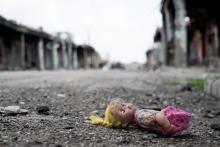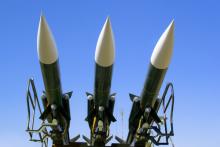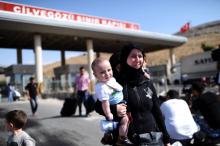chemical weapons

Chlorine gas has been used in Syria's civil war for years, but reports of chemical weapons used inside Iraq have been growing in recent weeks. Chlorine gas, mustard gas, and yellow phosphorous have all been discharged—sometimes against military targets, sometimes against civilians. In each case, the attacks leave telltale patterns of burns and physical damage.

IN EARLY SEPTEMBER, President Obama told the American people that the use of chemical weapons by Bashar al-Assad of Syria was a moral atrocity that required international consequences.
Religious leaders agree with the necessity of a determined response to the Assad regime, which is responsible for the deaths of 100,000 of his own people, including the brutal use of chemical weapons on civilians. But many faith leaders are asking tough moral questions about what that response should look like.
We fundamentally reject the assumption that refraining from military action is “doing nothing.” We need more imagination and a deeper response than the traditional one of military strikes, which haven’t proven effective and almost always have serious unintended consequences, risk dangerous escalations, and consistently create more suffering for innocent civilians.
As religious leaders, we are called to peacemaking, not just peace loving, which requires harder and more imaginative work than merely falling into old habits of military “solutions.” Our priorities should be to mobilize global support for the many vulnerable Syrians—including the millions of refugees—and to do the hard work of conflict resolution that could lead to a political solution.

There’s a catch phrase that comes to the fore when people start looking for religious reasons not to enter a war like the one now raging in Syria: “Who would Jesus bomb?”
Jesus would not have bombed anyone, of course. Bombs were not weapons of choice in his day. But the cruelty of war was no stranger to his era. The Romans could be every bit as cruel as Syria’s Bashar al-Assad. They executed dissidents like Jesus himself with ease. They leveled the city of Jerusalem.
But if it is hard to imagine Jesus targeting a cruise missile aimed at another nation, it is not hard to imaging him encouraging his followers to stand with those who are most vulnerable, to seek ways to defend others from cruelty, to come to the aid of those refugees displaced by war. The question is how best to do that.

Pope Francis on Thursday told world leaders gathered in Russia for the G-20 summit that a military intervention in Syria would be “futile,” urging them to focus instead on dialogue and reconciliation to bring peace to the war-torn country.
The Argentine pontiff’s first major foray onto the global stage comes as the U.S. Congress prepares to vote on a military strike against Syria in response to a reported chemical weapons attack outside Damascus on Aug. 21.
For Francis, just six months on the job, the Syria question will test his ability to summon the power of his global bully pulpit and could play a major role in shaping the global image of a man who’s drawn more attention for his down-to-earth pastoral appeal.

When a head of state is responsible for the deaths of 100,000 of his people and has used chemical weapons against innocent civilians — the world needs to respond. In one massive attack, the evidence appears to show that 1,429 people, including 400 children, suffered horrible deaths from chemical weapons banned by the international community. That is a profound moral crisis that requires an equivalent moral response. Doing nothing is not an option. But how should we respond, and what are moral principles for that response?
For Christians, I would suggest there are two principles that should guide our thinking. Other people of faith and moral sensibility might agree with this two-fold moral compass.
![Pope Gregory the Great, Carlo Saraceni [Public domain], via Wikimedia Commons Pope Gregory the Great, Carlo Saraceni [Public domain], via Wikimedia Commons](https://sojo.net/files/styles/medium/public/blog/Gregorythegreat.jpg)
As I began my morning devotions on Tuesday this week, Syria was on my mind. No surprise, right? The debate about whether to respond militarily to the use of chemical weapons is all over the news right now. Mostly folks are arguing about what actually happened and the larger geopolitical questions that a military strike involves, which are important and necessary issues. But here’s the question that was rattling around in my head as I turned to the day’s devotional readings on universalis.com: How does one respond to violence without becoming as guilty as the perpetrators you seek to punish?

PRESSURE IS BUILDING for the United States to become militarily involved in the Syrian civil war. The result would be further bloodshed and destruction for the people of Syria, the worsening of an already grave regional security crisis, and U.S. involvement in another Middle East war.
The Obama administration has apparently decided to provide arms to the rebels. Sen. John McCain and others in Congress are calling for a no-fly zone and air strikes against Syrian government targets. The increased hard line comes in response to allegations that Syrian government forces have used chemical weapons, crossing the “red line” President Obama warned against—although reports have surfaced that rebel forces also may have used chemical weapons.
Concerns about the use of chemical weapons are serious, but they are not a justification for military action that could drag U.S. forces into the deadly civil conflict. Bombing strikes would not be sufficient to neutralize Syria’s vast arsenal of chemical weapons, and they could cause chemical explosions that would release the deadly toxins we seek to contain.
For a military operation to achieve results, it would have to be a large-scale undertaking. Creating a humanitarian safe zone or attempting to impose a no-fly zone would require a major commitment of allied forces and would lead to serious military confrontation with hostile Syrian forces.